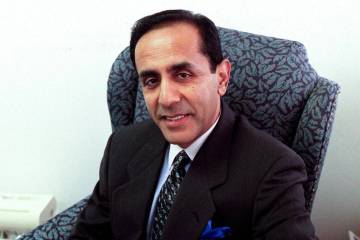Google CFO quits to spend time with family, as Silicon Valley seeks to help parents
Google’s CFO Patrick Pichette recently announced on his Google+ account that he’s leaving the company to travel and spend more time with his wife. He said his marriage was under stress because he spent too much time at work and not enough time with his family during his seven years as a CFO at Google.
“In the end, life is wonderful, but nonetheless a series of trade offs, especially between business/professional endeavours and family/community,” Pichette wrote on his Google+ page. “And thankfully, I feel I’m at a point in my life where I no longer have to have to make such tough choices anymore. And for that I am truly grateful.”
He also said he left his job to make sure the final years of his life were filled with uplifting memories for him and his wife — and because he had the financial security to take such a risk, which not all parents have.
But there’s somewhat of an irony to this. Despite Pichette’s recent departure from Google to spend more time making memories with loved ones, many companies in Silicon Valley have been seeking to help families in a number of ways, especially by providing generous paid parental leaves to employees and services to parents who care for loved ones with medical needs.
For example, Google offers parents 12 weeks of paid “baby bonding time,” and 18 weeks of paid maternity leave, according to Rebecca Grant of The Atlantic. This is especially notable during a time when paid parental leave benefits aren’t typically guaranteed by many American businesses.
Facebook also offers equal time off — four months paid, with an extra $4,000 stipend — for all parents, whether that’s a dad, mother or grandparent, Grant reported.
Similarly, Apple allows new mothers and fathers to take paid leave — four weeks before delivery and 14 weeks after for mothers, as well as six-weeks for dads — when they’re about to have a baby, Grant wrote.
And Change.org has one of the top paternity leave policies in the valley, offering 18 weeks of fully paid paternity leave for mothers and fathers, no matter if they’re the biological parent or not, according to Grant.
“Tech companies serve as a role model for the rest of the country when it comes to corporate culture,” Grant wrote “Thus the dichotomy that exists in how the tech industry has ramifications that extend far beyond Silicon Valley.”
Still, some Silicon Valley startups remain in the dark. Grant wrote that about 25 percent of the companies in Silicon Valley offer less than a month of paid paternity leave.
But if other tech startups follow the lead of the major players, like Google or Facebook, soon the entire valley will help out its working mothers and dads. And if enough startups walk down this path, it could lead to companies across the nation offering paternity leave to parents, Grant wrote.
“Startups have been willing enough to emulate Google in offering free lunch for employees and other perks in an effort to recruit and retain the best staffers,” Grant wrote. “Let’s hope that the same follow-the-leader routine soon takes place for supporting women and families.”
But Silicon Valley isn’t just helping the mothers and fathers who work there. The valley’s startups and highly successful companies are working on projects that could impact your family’s health concerns, too.
Some investors have funded companies that want to help cure rare diseases and medical issues that have caused deaths, according to Newsweek’s Betsy Isaacson. For example, investor Peter Thiel gave $3.5 million to the Methuselah Foundation, which is working to stop age-related cell damage. This would keep a person’s body from breaking down and help to improve an individual’s life expectancy, Isaacson wrote.
Similarly, other startups have worked to lengthen people’s lives, such as Project Calico, a Google-led effort helping to create a gene that leads to an “exceptional life span,” Isaacson wrote.
Other investors are funding 3-D printing companies that can print out artificial body parts to help the medically ill survive. And Intel is developing a computer that functions much like a human brain, according to Isaacson.
Tech startups are also working to help the 1 in 68 children who are diagnosed with autism, according to Arshya Vahabzadeh, a physician at Massachusetts General Hospital, who recently wrote for The Huffington Post.
Google, for example, will work with Autism Speaks in the coming months to stage an “autism app pitch competition,” which will help developers find the right way to mix autism care with technology, Vahabzadeh wrote.”We cannot wait. People want solutions now,” Ned Sahin, the found of the autism research company Brain Power, told Vahabzadeh. “If we can radically transform so many other industries with technology, then we can utilize the hardware and software to empower people with autism. We must give them practical tools to climb from potential to reality.”
Herb Scribner is a writer for Deseret News National. Send him an email at hscribner@deseretdigital.com or follow him on Twitter @herbscribner.




























